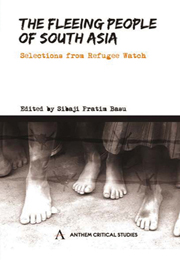Book contents
- Frontmatter
- Contents
- Acronyms and Abbreviations
- Foreword by Ranabir Samaddar
- Preface
- ETHICAL ISSUES
- LAWS
- SOUTH ASIA
- INDIA
- GENDER
- INTERVIEW/CORRESPONDENCE
- REPRESENTATIONS
- Introduction
- Creativity's Mirror
- Writing Displacement: Creativity and Objectivity
- Boundaries, Borders and Bodies
- Forced Displacement and Identity Formation in the EU
- The Changing Scales of Good and Evil: Morality Plays at the Profiled EU and US Borders
- Index
Creativity's Mirror
from REPRESENTATIONS
Published online by Cambridge University Press: 05 March 2012
- Frontmatter
- Contents
- Acronyms and Abbreviations
- Foreword by Ranabir Samaddar
- Preface
- ETHICAL ISSUES
- LAWS
- SOUTH ASIA
- INDIA
- GENDER
- INTERVIEW/CORRESPONDENCE
- REPRESENTATIONS
- Introduction
- Creativity's Mirror
- Writing Displacement: Creativity and Objectivity
- Boundaries, Borders and Bodies
- Forced Displacement and Identity Formation in the EU
- The Changing Scales of Good and Evil: Morality Plays at the Profiled EU and US Borders
- Index
Summary
With the collapse of Nazi Germany, Kathe Kollwitz and Bertolt Brecht's country was divided into two, East and West. Partition, then, was either the outcome of a full war or it could also be caused by the war-like disposition of two groups and their animal brutality proceeding hand in hand with pernicious politics –; for example, the partition of Bengal and Punjab. Partition, again, could foment an exodus of two kinds. One, single or collective efforts, frantic and despairing, to cross over barbed wires as depicted by Margarethe von Trota in her film Alexzanderplatzor; massive, multitudinous transfers of population associated with trauma and terror as recorded by Ritwik Ghatak, S M Sathyu, Govind Nihalni and Nemai Ghosh in their films. Taken together, war and partition in this century prompted massive migrations, which dehumanized millions. Adil Mansuri singled out the individual, broken and battered, as the microcosmic victim of the entire process in his poem When the injured Sun opened his Eyes:
When the injured sun opened his eyes here he was blinded
by the flash of daggers. Clouds of faithlessness thundered;
as we went out of our homes, our homes were wiped out.
The link line of soul and body was disconnected and the hands
raised for prayer were slashed.
Blood ties were reduced to ashes
And the ashes concealed words of introduction. It was
difficult to recognize the hazy spots: there were flames in the
distant horizon
And conflagration shooting out of the night's body. Numerous
ants were crushed on the roads; the startled pigeon on the window
was scared of his voice. […]
- Type
- Chapter
- Information
- The Fleeing People of South AsiaSelections from Refugee Watch, pp. 400 - 406Publisher: Anthem PressPrint publication year: 2009



